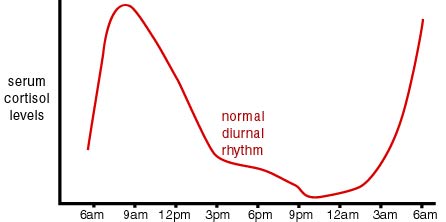Are You Suffering from the 21st Century Epidemic?
How Stress Effects Your Health
Every spring that dreadful day seems to sneak up on us: Daylight Savings. Most of us will wake the morning of, and many mornings after, feeling drowsy or like we are "off" and need more sleep. This lack of energy will continue until our biological clock reprograms itself and evolves to the new time setting. Our natural rhythm has been disrupted—our internal clock is still saying it is one hour earlier than the time on the alarm clock.
Because of the earth's rotation, almost all organisms function under a 24-hour day/night cycle called the Circadian Rhythm. This daily rhythm is not simply a response to alternating changes of day and night, it arises from an intrinsic timekeeping system referred to as the “biological clock.” This clock prepares us for changes in our physical environments, such as the rising and setting of the sun, and enables our cells and body systems to behave appropriately at the right time of day.
Mammals have an area of the brain called the suprachiasmatic nucleus (SCN) that functions as the master circadian pacemaker, controlling when we sleep and rest, and when we are awake and active. Circadian rhythms also control:
- Body temperature
- Blood pressure
- Heart activity
- Oxygen consumption
- Hormone secretion
- Metabolism
Disruption of the circadian rhythm due to lifestyle factors plays a role in the development of metabolic disorders such as obesity and diabetes.
It is widely accepted that an adrenal steroid hormone called Glucocorticoid (cortisol) has a daily variation in its circulating levels and is directly under the control of the circadian rhythm. Cortisol plays a crucial role in our adaptive response to various types of stress. Cortisol levels for a normal circadian rhythm look something like this:
When we are under stress, our circadian rhythm is affected. There is, however, a huge variety when it comes to different types of stressors. The three major categories are:
- Emotional
- Death of loved one
- Working with or for someone that is unpleasant
- Financial changes
- Divorce
- Moving to a new location
- Dietary (glycemic dysregulation)
- Low carb diet
- High carb diet
- Alcoholism
- Skipping meals
- Ingesting foods that trigger an immune or allergic response such as gluten, dairy, corn or peanuts
- Pain and hidden inflammation/infection
- Physical trauma such as motor vehicle accidents, sports injuries, surgeries
- Diseases such as arthritis, bursitis, or anything that ends in “itis,” which means “inflammation”
- Unknown influences such as liver toxicity due to heavy metal exposure, or infections that have gone undetected such as parasites and poor gut bacteria
Humans were not designed to endure chronic stress.
We have not evolved to handle the modern day stresses listed above. Our bodies hold on to our innate need for survival—that is why the stress response is called "fight or flight."
When we are locked in any of the situations listed above, we cannot handle it and, additionally, we have a revved up system that is unable to act. When this happens, cortisol levels go up and stay up. Consequently, we suppress our immune systems, causing blood sugar handling dysregulation, and we become unable to handle mental or emotional stress because we are stuck in over-reactive mode.
With constant overstimulation, many people experience HPA-D and cortisol dysregulation (the amount of cortisol available throughout the day and throughout our circadian rhythm cycle). HPA-D is a brain-to-body hormone dysregulation that affects many processes throughout and is the root cause of many chronic health conditions. HPA-D and an inefficient circadian rhythm can display any or all of the following symptoms:
- Excessive fatigue
- Dry skin
- Neck/back pain
- Inability to hold a chiropractic adjustment
- Food allergies
- Environmental allergies
- Hair loss
- Hormone imbalance
- Irritability
- Inability to lose weight
- Fatigue headache
- Poor immune response
- Insomia
- Depression
- Cravings
- Dizziness
- Anxiety
- Lack of concentration
- Poor memory
- Gastrointestinal issues such as indigestion or bowel problems
I see this daily in my practice as a functional nutritionist. We run a lab-based saliva panel that tests the cortisol level several times throughout the day to determine what the patient’s rhythm looks like and when it is deficient. Then we treat the underlying causes rather than the symptoms. This is functional medicine.
People have chronic health issues not being addressed by mainstream medicine. While these health issues may require lifestyle and dietary changes, they also most likely require healing of HPA-D. If you are experiencing these symptoms, contact me. I know how to help you so your body can start healing. Sign up for a 20-minute Health Discovery Session
with me for $49 and we’ll get you started on a path toward better health today.
Don't Miss Out On More!

Heidi Toy FNTP
I help people all over the world heal by identifying and treating the root cause of their body imbalances. Through diet and nutrition, I guide them towards wholeness and balanced lives.
Heidi Toy Functional Medicine Blog

For many of us, our experience with food comes with some sort of baggage. Maybe you eat to cope with stress, anxiety or depression. Maybe you’ve grown up with value-words placed on food such as “junk” and “healthy,” and told you couldn’t eat the “good stuff” (brownies and ice cream) until you finished the “yucky stuff” (broccoli and lettuce). Or, even more serious, maybe you or a loved one has struggled or is struggling with an eating disorder. Food is amazing and life-giving. It can be used as a means to celebrate, socialize, or simply just provide fuel for the body. Our relationship with food shouldn’t be a difficult one, it should be an enjoyable one. A way to get to that healthy place in your relationship is to practice mindful eating. Mindfulness is a Buddhist concept of mediation that can help you recognize emotions and physical sensations present. Through mindful eating, you can learn to truly pay attention to your experiences, cravings and physical cues. The basics of mindful eating are: Eat slowly, without distraction. If you are eating with others, take a least five minutes at the start of the meal to enjoy the food on your plate before engaging in discussion. Pay attention to your body--are you still hungry, or are you getting full? Learn to distinguish between cravings and true hunger. Use all your senses when you sit down to a meal. Make an effort to notice how the food looks, smells, tastes, feels in your mouth, and sounds when you chew. Appreciate your food, who has prepared it (even if it’s you--what an accomplishment!), and where it comes from. Being mindful of your experience will help you slow down while eating. This can prevent overindulgence by making the act of eating intentional instead of automatic. It will also help you become aware of triggers that make you want to eat (are you truly hungry at 9pm every night when you sit down to watch that Netflix show, or do you just pour yourself a bowl of Chex Mix because that’s what you always do?). Knowing your triggers can give you time to process what’s truly going on and the ability to react properly.

Here are the essential functional medicine steps for Fifth Disease! If your child comes home with bright red cheeks that look like they’ve been “slapped,” chances are they may have fifth disease, also known as erythema infectiosum. This mild viral illness, caused by parvovirus B19, is common in kids and often spreads t

Successfully healing Adrenal Fatigue requires a holistic approach focussed on fixing the root cause of your problems and supporting your body through the healing process. This means we are going beyond just temporary symptom relief. We want you to return to vibrant health so you can get back to the active and healthy lifestyle that Adrenal Fatigue is holding you back from. (Adrenal Fatigue is more accurately known as HPA-D. Check out my blog HPA-D vs Adrenal Fatigue to learn more.)Again, we would be completing further testing to get to the root cause of your issues, but this protocol is a great starting point for healing. We focus on five essential areas for fast and long-term healing.

I want it! Sooooooo bad. But I want to lose weight, too. It’s not on my list of healthy, squeaky clean healing foods, but what will one little bite hurt? I can start again fresh and clean tomorrow. When brownies call your name and you are trying to break up with them, it is difficult to avoid the urge to want to indulge. But you know if you give in that you will berate yourself with guilt for the next 24-48 hours and the tsunami of eating everything off-plan will take over your life. One bite will start an avalanche... But you just can't stop thinking about the pan of brownies you made for the kids.

Did you know most people didn’t have refrigerators in their homes until well into the 1900’s? It wasn’t even invented for large scale commercial use until the mid 1800’s [1]. So how did people keep their milk cold and make their food last longer? Fermentation. It sounds like a gross concept, because we often associate fermentation with a bad odor, but foods like cheese, yogurt, sauerkraut and pickles are all fermented foods. And those aren’t gross, are they? Well, some might disagree with me about sauerkraut, but that’s beside the point. Fermented foods are digestive aids. Microscopic living organisms in fermented foods help extend the food’s shelf life, enhance flavor, and help the body absorb minerals. These organisms pre-digest the food, getting rid of harmful components, and create more vitamins and enzymes than the food began with. Enzyme-rich foods have many benefits including [2]: Increase digestibility of food we eat Boost immune system Increase alkalinity; neutralizing pH levels Provide a healthy balance of friendly flora in the gut (Learn more about your microbiome in my other blog posts ) Tone the colon and help with elimination Control cravings for unhealthier foods Eliminate toxins and undigested wastes in the body In the “old days,” people use to ferment all kinds of foods through pickling, canning, pasteurization and added salt. Nowadays, however, large scale fermentation has lost many of its nutritious benefits due to the need for speed to get the product on the shelf as fast as possible and as cheap as possible. The only true fermented foods you will find are sauerkraut, kombucha, yogurt and kefir, beans, wine and beer, some meats (such as salami and pastrami), legumes and nuts (such as tofu, soy sauce and miso), sourdough bread, and various kinds of vegetables [3]. Fun facts about sauerkraut: The Germans “stole” it from the Chinese! Sauerkraut (probably not labeled as such for the Chinese, but the same recipe) was one of the main foods for those who built the Great Wall of China. Genghis Khan brought it to Eastern Europe during an invasion. It also contains high levels of vitamin C, and sailors often took it on long journeys to prevent scurvy.

How can we best keep blood sugar stable? Do what our body is designed to do – use fat for energy. Our species did not survive the Ice Age because of vanilla coffee lattes and cheesecake. Throughout most of our history, we ate a diet that was likely 50-70 percent fat. Look at the old family photo albums, specifically pictures of people in the first half of the 1900s, before we had so many processed foods. You won’t see many fat people--in fact, most look darn skinny. If they lived on the farm, they ate lots of eggs, meat, milk, and vegetables out of their own backyards. “Diet foods” were non-existent. Heart disease was almost non-existent. Our metabolism is designed to work much better with fats better than with sugar. Fats provide the slow and steady fuel our body likes to use for energy. Think of fats as a slow-burning log on the fire. One log (i.e. one meal containing fats) lasts for hours. Starchy carbs, on the flip side, are like kindling. You constantly have to throw more twigs (chips, pasta, bagels) to keep the fire burning. The first step is to know your sugars by reading the labels, and then avoid said sugars as much as possible.









































































































